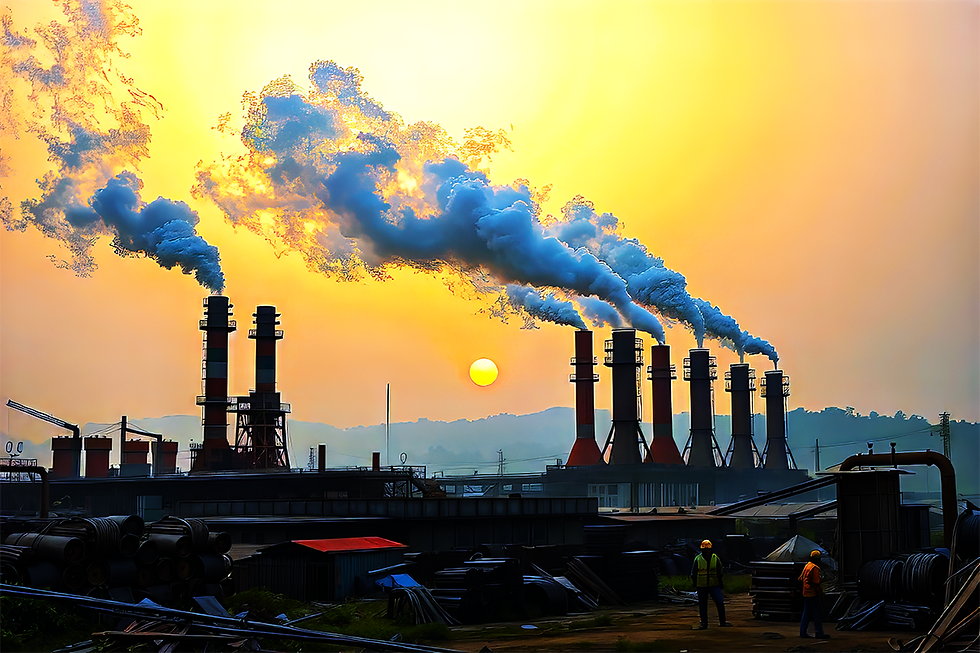VirFerrOx
Low-Emission Lexicon Lends Lucidity to Steel Standards
Tuesday, July 29, 2025
Synopsis:
Synopsis: Based on ArcelorMittal’s recent press release, ArcelorMittal entities in Belgium, France, Luxembourg & Spain have joined the Low Emission Steel Standard (LESS). This voluntary standard, now backed by steelmakers covering nearly 45% of Europe’s steel production, seeks to unify how low-carbon steel is defined & labelled. ArcelorMittal Belgium CEO Frederik Van De Velde has joined the LESS board, underscoring the firm’s drive to harmonise sustainability criteria, boost low-emission steel demand & support Europe's decarbonisation efforts.

Harmonising Heterogeneous Horizons Highlights Hope
Europe's steel industry, long criticised for fragmented definitions, is witnessing cohesion as ArcelorMittal’s units in Belgium, France, Luxembourg & Spain align under the LESS initiative. LESS, though voluntary, represents a step towards a uniform standard for low-emission steel, offering clarity to regulators & consumers alike. “A unified standard is vital to progress in decarbonisation,��” said Frederik Van De Velde, ArcelorMittal Belgium CEO. This alignment signals intent to replace disjointed metrics with shared benchmarks that can catalyse meaningful carbon reductions across the continent.
Voluntary Vanguard Ventures Validate Visionary Value
LESS now counts steel producers covering nearly 45% of Europe’s output among its members, transforming what began as an aspirational pledge into an industry movement. ArcelorMittal Germany joined as a founding member in 2024, paving the path for peers across Western Europe. The coalition’s strength stems from collective endorsement, which reassures buyers & policymakers of credible, auditable emissions data. As Van De Velde noted, this groundwork aims to lay “binding sustainability criteria in public projects” that could solidify demand & guide investment.
XCarb® Xenodochy Expands European Endeavours
ArcelorMittal’s XCarb® product suite exemplifies commercial adaptation to green demand, offering recycled & renewably produced steel and CO₂-saving certificates. The firm sold 400,000 metric tons of XCarb® steel in 2024, with growth forecasted in 2025. Certificates, independently audited, allow clients to demonstrate climate-conscious procurement. “XCarb® turns intangible carbon savings into marketable proof,” explained a spokesperson, highlighting how documentation complements physical low-emission steel to capture premium segments in automotive & construction.
Decarbonisation Deliberations Delay Development
Despite momentum, large-scale decarbonisation projects advance slower than planned due to limited policy clarity & market pull. ArcelorMittal’s strategic investments currently focus on two electric arc furnace projects in Gijón & Sestao, Spain. These facilities promise to expand XCarb® capacity, but full realisation hinges on regulatory incentives. “Competitiveness & return on investment require a stable framework,” the firm stated, noting that Europe’s Steel & Metals Action Plan could become a catalyst if its proposals materialise into binding measures.
Regulatory Resilience Reinforces Renewable Routes
The European Commission’s Steel & Metals Action Plan, unveiled in March, proposes integrating resilience & sustainability criteria into public procurement. By favouring EU-produced low-carbon steel, policymakers hope to stimulate demand, creating green lead markets that justify capital expenditure. Van De Velde sees this as sine qua non for progress: “Binding criteria can transform voluntary commitments into systemic change,” he asserted, underscoring how regulation bridges ambition & real-world impact.
Market Momentum Magnifies Multinational Mandates
Consumer interest in green steel has surged, but conventional steel still dominates Europe's output. LESS seeks to bridge this gap by providing a trusted label that resonates from steelmakers to end-users. ArcelorMittal’s membership, spanning five countries, amplifies the message beyond borders. “We see green demand growing fastest in automotive & infrastructure,” said an ArcelorMittal executive, suggesting that cross-market momentum could incentivise peers & accelerate industry-wide decarbonisation.
Sustainability Strategy Spurs Synergistic Shifts
ArcelorMittal’s engagement in LESS aligns corporate sustainability targets with regional climate goals. By backing a collective standard, the company demonstrates how voluntary industry action can complement, not replace, formal regulation. “Producers, customers & regulators must collaborate,” Van De Velde emphasised, envisioning an ecosystem where shared definitions reduce confusion & foster trust. This harmonised approach helps channel capital into innovations like EAFs & carbon capture, ultimately steering the sector closer to climate neutrality.
Carbon Certificates Cement Credibility & Confidence
Beyond physical steel, ArcelorMittal leverages certificates to quantify avoided emissions, each audited by independent bodies. These documents let clients offset carbon footprints or meet internal sustainability targets. “Certification builds credibility in a market wary of greenwashing,” explained an industry analyst. Coupled with LESS’s unified framework, certificates offer a dual approach: transparent labelling for procurement & documented proof for compliance reporting, strengthening market confidence & supporting long-term decarbonisation.
Key Takeaways
ArcelorMittal joined LESS, now covering ~45% of Europe’s steel production
XCarb® sales hit 400,000 metric tons in 2024, driven by green demand
EU’s Steel & Metals Action Plan may boost low-emission steel markets






















































































.png)










